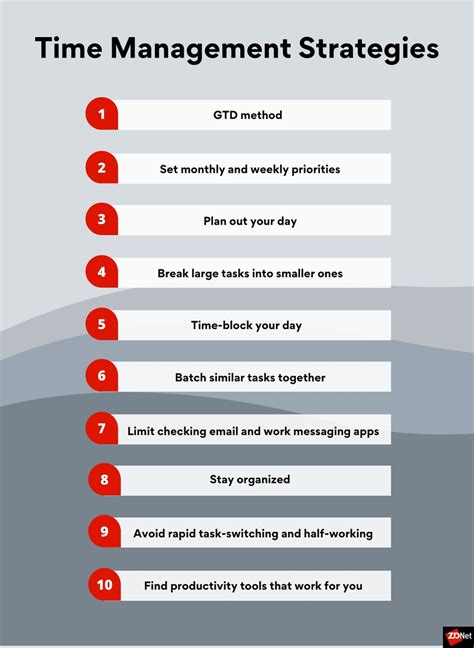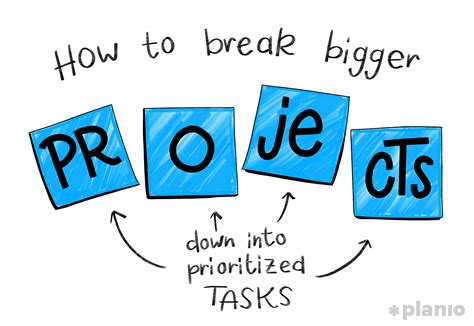In today's fast-paced world, being able to manage your time effectively is crucial. Whether you're a student, a professional, or just someone trying to juggle multiple aspects of life, mastering the art of time management can significantly enhance your productivity. By implementing these innovative strategies, you can streamline your daily routine, accomplish more in less time, and create a harmonious work-life balance.
1. Prioritize with Purpose:
Your to-do list may seem never-ending, but it's crucial to distinguish between tasks that are urgent and those that are important. Develop a clear sense of direction by focusing on tasks that align with your long-term goals and have a significant impact on your success. Highlighting the most crucial tasks will ensure that your energy is invested wisely, resulting in increased productivity and a sense of accomplishment.
2. Embrace the Power of Planning:
Do you often find yourself overwhelmed by a deluge of tasks? Take control by planning your day in advance. Consider using productivity apps or good old-fashioned pen and paper to break down your tasks into manageable chunks. Scheduling specific time slots for each task will help you stay organized, reduce procrastination, and allow you to make the most of your valuable time.
3. Optimize your Environment:
A cluttered workspace is a breeding ground for distractions and can severely hamper your ability to focus. Embrace minimalism by decluttering your physical and digital space. Ensure that the essentials are easily accessible, maintaining a clean and uncluttered environment conducive to concentration and productivity.
4. Harness the Power of Technology:
With a wide array of productivity apps and tools available at your fingertips, it's essential to leverage technology to your advantage. From time-tracking apps to task management software, these tools can assist in tracking your progress, eliminating distractions, and automating repetitive tasks, freeing up valuable time for meaningful work.
5. Practice Effective Communication:
Effective communication is key to managing your time. Clearly define your expectations with colleagues, clients, or family members. Set boundaries and learn to say no when necessary. Effective communication ensures that everyone is on the same page, reducing misunderstandings and allowing you to focus on your priorities without unnecessary interruptions.
6. Embrace the Power of Saying "No":
Saying "no" can be challenging, but it's crucial for maintaining your productivity and mental well-being. Learn to decline requests that do not align with your goals or values. By setting boundaries and establishing your priorities, you can confidently decline tasks that would consume your time and energy without significant benefit.
7. Break Tasks into Bite-sized Pieces:
Large and complex tasks can be intimidating and overwhelming. Break them down into smaller, more manageable tasks. By tackling them one step at a time, you can maintain momentum and prevent procrastination. This approach also allows you to track your progress more effectively, providing a sense of accomplishment with each completed task.
8. Take Regular Breaks:
Productivity does not mean constantly working without breaks. In fact, taking regular breaks is essential for maintaining focus and preventing burnout. Incorporate short breaks into your schedule to recharge and rejuvenate. Engage in activities that help you relax and clear your mind, such as stretching, deep breathing, or taking a short walk.
9. Cultivate a Growth Mindset:
Adopting a growth mindset can significantly influence your approach to time management. Embrace challenges, learn from mistakes, and seek opportunities for self-improvement. Viewing setbacks as learning opportunities can enhance your resilience, motivation, and ultimately, your productivity.
10. Celebrate Your Achievements:
As you strive for increased productivity, don't forget to celebrate your accomplishments, no matter how small they may seem. Acknowledge your progress and reward yourself for milestones achieved. This positive reinforcement will fuel your drive and inspire you to continue striving for excellence.
By implementing these innovative time management techniques, you can transform your productivity and achieve success in all areas of your life. Remember, it's not about managing time; it's about managing yourself and making the most of the time you have.
10 Effective Strategies for Efficient Time Control

In today's fast-paced world, achieving success often hinges on our ability to effectively manage our time. This section will delve into ten powerful strategies that can help you master the art of time control and boost your overall productivity. Discover how small adjustments in your daily routine can make a significant difference in achieving your goals.
Prioritize tasks based on significance and deadlines
In order to effectively manage your time and increase productivity, it is essential to prioritize tasks based on their importance and deadlines. Prioritization allows you to focus your energy and resources on the tasks that will have the most significant impact and need to be completed within a specific timeframe.
Identify the significance: Begin by assessing the importance of each task on your to-do list. Consider the potential outcomes or consequences associated with completing or not completing each task. This will help you determine which tasks are vital for achieving your goals or meeting your obligations.
Evaluate the deadlines: Take into account the deadlines assigned to each task. Some tasks may have strict deadlines, while others may be more flexible. Understanding the time constraints will enable you to allocate your time and effort accordingly.
Prioritize based on urgency: Once you have determined the significance and deadlines of your tasks, arrange them in order of urgency. Give priority to tasks that have close deadlines or require immediate attention. This will ensure that you address time-sensitive matters first and avoid any last-minute rushes or missed deadlines.
Consider long-term goals: While considering the significance and deadlines, also keep in mind your long-term goals. Certain tasks may not have immediate deadlines but contribute significantly to your overall objectives. By prioritizing these tasks early on, you can make progress towards your long-term goals and improve your productivity in the long run.
Re-evaluate as necessary: As your priorities may change over time, it is important to regularly re-evaluate and adjust your task prioritization. New deadlines may arise, or the significance of certain tasks may shift. By staying flexible and adapting your prioritization strategy, you can effectively manage your time and stay on track towards achieving your goals.
By prioritizing tasks based on their significance and deadlines, you can ensure that your time and energy are utilized efficiently. This approach enables you to focus on the most important and time-sensitive tasks, leading to improved productivity and overall success.
Breaking Down Larger Tasks for Greater Efficiency

When faced with complex and demanding projects, it can be easy to feel overwhelmed and disorganized. However, by breaking larger tasks into smaller, more manageable chunks, individuals can increase their productivity and achieve better results.
In order to effectively break down larger tasks, it is important to focus on identifying the main objectives and breaking them into smaller steps. This approach allows for a clear and structured approach, making it easier to prioritize and tackle each individual component.
- Chunking: Divide the task into smaller chunks that can be completed in a specific period of time. This enables you to mentally process and accomplish each section more effectively.
- Sequencing: Determine the logical order in which the smaller tasks need to be completed. This helps to establish a roadmap and ensures a smooth flow throughout the project.
- Prioritizing: Assess the importance and urgency of each task within the larger project. This allows you to allocate your time and resources efficiently, focusing on the most critical elements first.
- Setting milestones: Break the larger task into significant milestones, providing a sense of progress and motivation. Celebrating these milestones can also boost morale and keep you on track.
- Time allocation: Estimate the amount of time needed for each smaller task. This will help you manage your time effectively and avoid overcommitting to unrealistic deadlines.
- Eliminating distractions: Create a conducive work environment by removing distractions that can hinder your progress. Minimize interruptions and focus solely on the task at hand.
- Utilizing productivity techniques: Implement time management techniques such as the Pomodoro Technique or time blocking to enhance your efficiency and maintain focus.
- Delegate: If possible, delegate smaller tasks to team members or colleagues. This not only lightens your workload but also encourages collaboration and improves overall productivity.
- Regular breaks: Give yourself regular breaks between completing each smaller task. This allows for mental rest and rejuvenation, helping to maintain productivity throughout the project.
- Review and adjust: Regularly review your progress and adjust your approach if necessary. This ensures that you stay on track and adapt to any changes or challenges that may arise.
By implementing these strategies and breaking down larger tasks into smaller, more manageable chunks, individuals can increase their productivity and achieve their goals in a more efficient and organized manner.
Setting Clear Objectives and Deadlines for Each Task
One of the key strategies for effective time management and increased productivity is to establish specific goals and deadlines for every task you undertake. By clearly defining what needs to be accomplished and when it should be completed, you can enhance focus, prioritize tasks, and efficiently allocate your time and effort to ensure optimal productivity.
A well-defined goal provides a sense of direction and purpose, helping you stay motivated and focused on the task at hand. When setting goals, avoid vague or ambiguous statements; instead, be precise and specific about what you want to achieve. This clarity will enable better planning and execution of your tasks.
Another essential element for effective time management is establishing deadlines for each task. A deadline creates a sense of urgency and helps you avoid procrastination. When setting deadlines, consider the complexity and importance of the task, as well as the resources and available time. Be realistic in your estimations and set deadlines that push you to stay efficient without causing unnecessary stress.
- Break down larger tasks into smaller, manageable sub-tasks with their respective objectives and deadlines.
- Prioritize your tasks based on their urgency and importance, focusing on those that align with your overall goals.
- Utilize tools such as task management apps or calendars to keep track of deadlines and progress.
- Regularly review and reassess your objectives and deadlines to adapt to any changes or unforeseen circumstances.
By setting specific goals and deadlines for each task, you can effectively manage your time, maintain focus, and achieve your desired outcomes while maximizing productivity.
FAQ
What are some time management tips for improving productivity?
Some of the top time management tips for improving productivity include setting goals, prioritizing tasks, eliminating distractions, planning and scheduling, and delegating responsibilities.
How can setting goals help with time management?
Setting goals helps with time management by providing a clear focus and direction. It allows individuals to prioritize their tasks and allocate time accordingly.
Why is it important to eliminate distractions for effective time management?
Eliminating distractions is important for effective time management because it helps individuals stay focused on their tasks and prevents time wastage. Distractions can significantly reduce productivity.
How does delegating responsibilities contribute to improved productivity?
Delegating responsibilities allows individuals to free up time for more important tasks and enables them to leverage the skills and expertise of others. It helps distribute workload and increases overall productivity.



